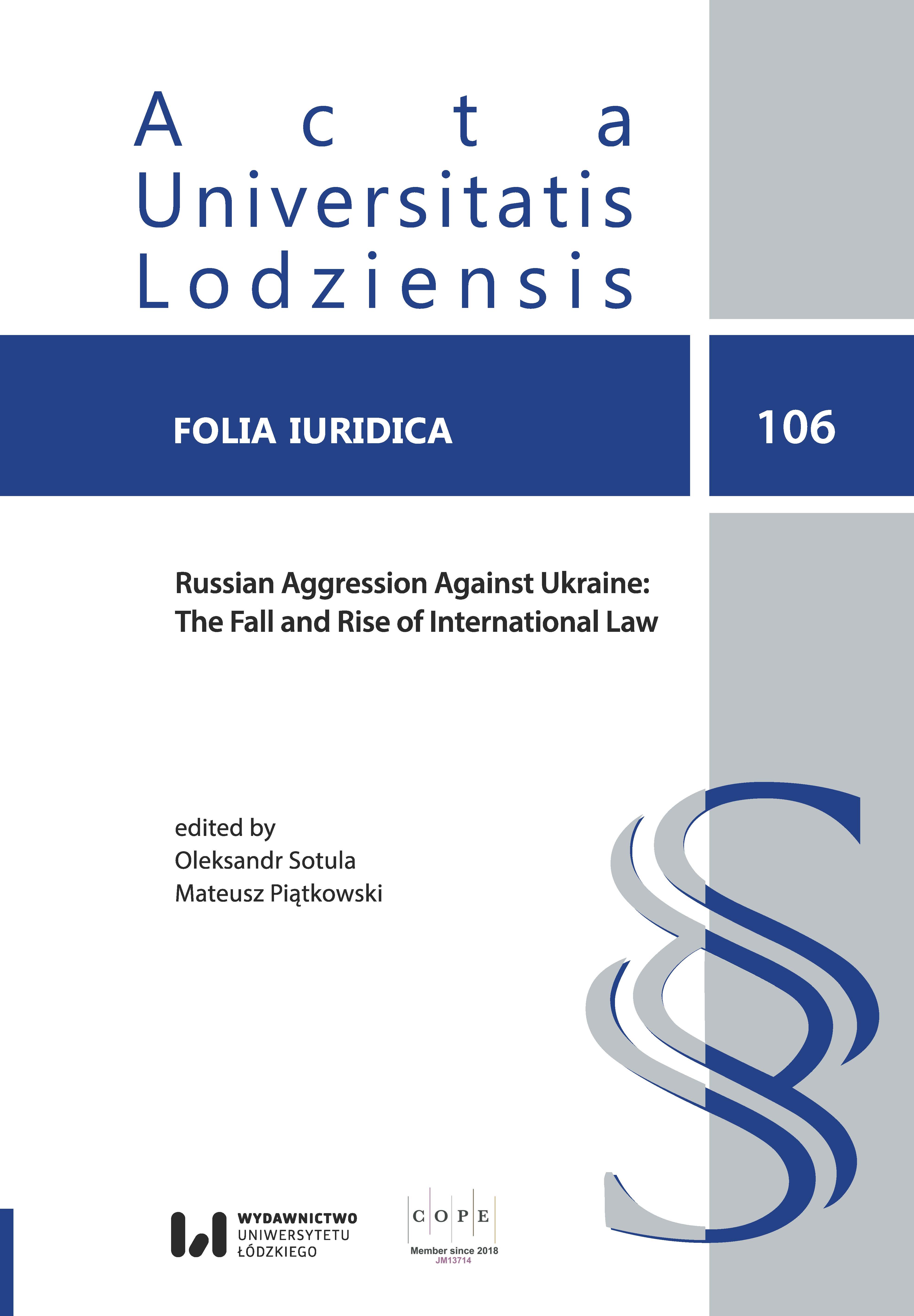Świadczenie usług telekomunikacyjnych przez Starlink w trakcie konfliktu zbrojnego a możliwe konsekwencje w ramach prawa publicznego międzynarodowego
DOI:
https://doi.org/10.18778/0208-6069.106.11Słowa kluczowe:
międzynarodowe prawo kosmiczne, Elon Musk, starlink, Ukraina, USAAbstrakt
Niniejszy artykuł ma na celu zaprezentowanie najistotniejszych regulacji międzynarodowych dotyczących świadczenia usług o charakterze telekomunikacyjnym przez podmioty niepubliczne jednej lub większej ilości stron aktywnego konfliktu zbrojnego. Biorąc za przykład szeroko komentowany przypadek firmy Starlink, która rzekomo miała odmówić udostępnienia swojej sieci rządowi Ukraińskiemu, artykuł ten stara się przedstawić skrótowe studium tego przypadku z perspektywy prawa publicznego międzynarodowego, jak również regulacji międzynarodowych poświęconych wyłącznie kwestiom wykorzystania przestrzeni kosmicznej. Analiza ta w szczególności dotyczy reguł poświęconych przypisywalności państwu działań podmiotów prywatnych jak i pokojowemu wykorzystaniu przestrzeni kosmicznej.
Pobrania
Bibliografia
Brown, Tara. 2022. “Ukraine Symposium – The risk of commercial actors in outer space drawing states into armed conflict”. Lieber Institute West Point Articles of war, July 8, 2022. https://lieber.westpoint.edu/commercial-actors-outer-space-armed-conflict/
Google Scholar
Farley, Robert. 2020. “Space Force: Ahead of Its Time, or Dreadfully Premature?” CATO Institute, December 1, 2020. https://www.cato.org/policy-analysis/space-force-ahead-its-time-or-dreadfully-premature
Google Scholar
Finch, Edward R. Jr. 1968. “Outer Space for ‘Peaceful Purposes.’” American Bar Association Journal 54(4): 365–367.
Google Scholar
Goines, Timothy. 2022. “The Russia – Ukraine war and the space domain.” Lieber Institute West Point Articles of war, March 14, 2022. https://lieber.westpoint.edu/russia-ukraine-war-space-domain/
Google Scholar
ICEYE. 2023. “CEYE Signs Contract to Provide Government of Ukraine with Access to Its SAR Satellite Constellation.” https://www.iceye.com/press/press-releases/iceye-signs-contract-to-provide-government-of-ukraine-with-access-to-its-sar-satellite-constellation (accessed: 7.11.2023).
Google Scholar
International Court of Justice. 1980. “United States Diplomatic and Consular Staff in Tehran (United States of America v. Iran)”. Hague.
Google Scholar
International Court of Justice. 1986. “Military and Paramilitary Activities in and against Nicaragua (Nicaragua v. United States of America)”. Hague.
Google Scholar
International Law Commission. 2001a. “Responsibility of States for Internationally Wrongful Acts.” Yearbook of the International Law Commission. Vol. II, https://legal.un.org/ilc/texts/instruments/english/draft_articles/9_6_2001.pdf
Google Scholar
International Law Commission. 2001b. “Draft articles on Responsibility of States for Internationally Wrongful Acts, with commentaries.” Yearbook of the International Law Commission. Vol. II, https://legal.un.org/ilc/texts/instruments/english/draft_articles/9_6_2001.pdf
Google Scholar
Iran-U.S. Claims Tribunal. 1987. “Kenneth P. Yeager v. The Islamic Republic of Iran.” Award No. 324-10199-1, November 2, 1987.
Google Scholar
Jakhu, Ram. 2006. “Legal Issues Relating to the Global Public Interest in Outer Space”. Journal of Space Law 32(1): 31–110.
Google Scholar
League of Nations. 1923. “Official Journal, 4th Year, No. 11”. November 1923. Hague.
Google Scholar
Lyall, Francis. Paul Larsen. 2009. “Space Law: A treatise.” Burlington: Ashgate Publishing Company.
Google Scholar
Morgan, Richard. 1994. “Military Use of Commercial Communication Satellites: A New Look at the Outer Space Treaty and Peaceful Purposes”. Journal of Air Law and Commerce 60(1): 237–327.
Google Scholar
Musk, Elon (@elonmusk). 2023. “There was an emergency request from government authorities to activate Starlink all the way to Sevastopol.” Tweet, September 8, 2023. https://twitter.com/elonmusk/status/1699917639043404146?s=46&t=bZcrLpl8DTxSpYLBntBfhQ
Google Scholar
Noorden, Wolf D. von. 1995. “Inmarsat Use by Armed Forces: A Question of Treaty Interpretation”. Journal of Space Law 23(1): 1–18.
Google Scholar
Satariano, Adam. 2023. “Elon Musk doesn’t want his satellites to run Ukraine’s drones.” The New York Times, February 9, 2023. https://www.nytimes.com/2023/02/09/world/europe/elon-musk-spacex-starlink-satellite-ukraine.html
Google Scholar
Sheetz, Michael. 2022. “Elon Musk’s SpaceX sent thousands of Starlink satellite internet dishes to Ukraine, company’s president says.” CNBC, November 5, 2023. https://www.cnbc.com/2022/03/22/elon-musk-spacex-thousands-of-starlink-satellite-dishes-sent-to-ukraine.html
Google Scholar
Trump, Donald. 2018. “Text of a Memorandum from the President to the Secretary of Defense Regarding the Establishment of the United States Space Command.” White House, December 18, 2018. https://csps.aerospace.org/sites/default/files/2021-08/US%20Space%20Command%20memo%2018Dec18.pdf
Google Scholar
United Nations. 1951. “Reports Of International Arbitral Awards.” Vol. IV. New York.
Google Scholar
United Nations. 1967. “Treaty on Principles Governing the Activities of States in the Exploration and Use of Outer Space, including the Moon and Other Celestial Bodies.” United Nations Treaty Collection, registration number 8843.
Google Scholar
United Nations. 1968. “Agreement on the Rescue of Astronauts, the Return of Astronauts and the Return of Objects Launched into Outer Space.” United Nations Treaty Collection, registration number 9574.
Google Scholar
United Nations. 1972. “Convention on International Liability for Damage Caused by Space Objects.” United Nations Treaty Collection, registration number 13810.
Google Scholar
United Nations. 1976. “Convention on Registration of Objects Launched Into Outer Space.” United Nations Treaty Collection, registration number 15020.
Google Scholar
Pobrania
Opublikowane
Wersje
- 2024-06-18 - (2)
- 2024-03-30 - (1)
Jak cytować
Numer
Dział
Licencja

Utwór dostępny jest na licencji Creative Commons Uznanie autorstwa – Użycie niekomercyjne – Bez utworów zależnych 4.0 Międzynarodowe.














